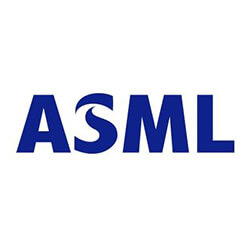
ASML Holding
ASML is a Dutch company and currently the largest supplier in the world of photolithography systems for the semiconductor industry.
ASML is a Dutch company and currently the largest supplier in the world of photolithography systems for the semiconductor industry. The company manufactures machines for the production of integrated circuits. The company is a component of the Euro Stoxx 50 stock market index.
The photolithography machines manufactured by ASML are used in the production of computer chips. In these machines, patterns are optically imaged onto a silicon wafer that is covered with a film of light-sensitive material (photoresist). This procedure is repeated dozens of times on a single wafer. The photoresist is then further processed to create the actual electronic circuits on the silicon. The optical imaging that ASML’s machines deal with is used in the fabrication of nearly all integrated circuits, and as of 2010, ASML has 67 percent of the worldwide sales of lithography machines, with the competition consisting of Ultratech, Canon and Nikon.
As of 2011, their high-end Twinscan NXT:1950i system is used for producing features down to 32 nanometres (and outlook for 22 nm) at up to 200 wafers per hour, using a water immersion lens and an argon fluoride laser that produces light at a wavelength of 193 nm. As of 2011, an average lithography machine costs 27 million euros.
ASML manufactures extreme ultraviolet lithography machines that produce light in the 13.3-13.7 nm wavelength range. A high-energy laser is focused on microscopic droplets of molten tin to produce a plasma, which emits EUV light. In 2009, the IMEC research center in Belgium produced the world’s first functional 22 nm CMOS SRAM memory cells with a prototype EUV lithography machine. Series-produced (non-prototype) EUV machines were shipped in 2011.
In addition to immersion-based lithography and EUV lithography, ASML has a substantial intellectual property portfolio covering imprint lithography.
Featured Video
- Operating Status: Active
- Business Type Public
- Headquarters Veldhoven, Netherlands
- Founded Date 1984
- Organization CEO Peter Wennink
- Founders ASM International